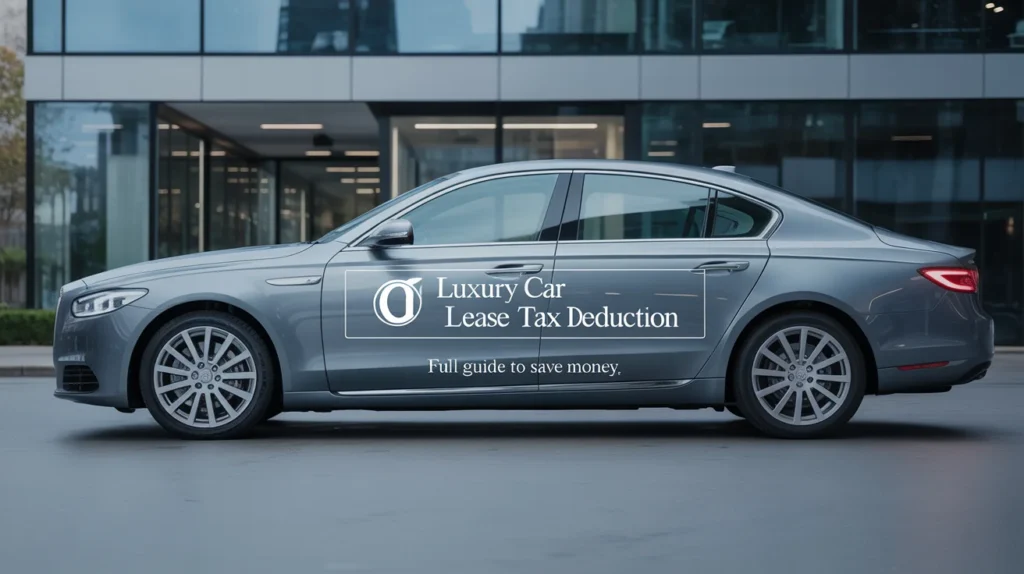Luxury Car Lease Tax Deduction – Full Guide to Save Money
A luxury car lease tax deduction is a smart strategy for business owners and self-employed professionals seeking to reduce their taxable income while enjoying premium vehicles.
Whether you’re driving a BMW, Tesla, or Mercedes-Benz for business purposes, understanding how to deduct lease payments legally can lead to significant savings.
In this comprehensive guide, we’ll cover every aspect, from IRS rules to deduction limits, making it simple and beneficial for users seeking clarity and compliance.
Understand the Basics of a Luxury Car Lease Tax Deduction
A luxury car lease tax deduction allows qualified individuals to deduct part of their vehicle lease payments if used for business. The IRS treats leased cars as business expenses, making them eligible for tax write-offs under certain limits.
To claim this deduction, the vehicle must be used primarily for business. The IRS requires detailed mileage logs and accurate calculations of business use percentages. Personal use does not qualify and must be excluded.
Choosing to lease instead of buy also helps avoid the complexities of depreciation. Leasing provides predictable costs, lower down payments, and simpler deductions.
IRS Limits and Thresholds You Should Know
Before you claim the luxury car tax deduction, you must understand the IRS’s lease inclusion amount rule. This rule limits how much you can deduct based on the car’s fair market value (FMV) at lease inception.
If your leased vehicle’s FMV exceeds a certain threshold (which adjusts yearly), a portion of the lease cost must be added back to your taxable income. This “lease inclusion” reduces the deduction but ensures fair compliance.
Key Points to Understand:
- The IRS updates these limits yearly; please consult the current Lease Inclusion Table for the most up-to-date information.
- Cars valued under the IRS limit have fewer deduction restrictions.
- You must maintain a mileage log for precise business-use calculation.
Benefits of Leasing Over Buying for Tax Deductions
Leasing offers flexibility and tax advantages that ownership doesn’t. Here’s why many professionals prefer leasing over purchasing luxury vehicles for business use:
Leased vehicles avoid depreciation hassles. Tax deductions are based on actual payments instead of complex depreciation schedules. Plus, upgrading vehicles is easier and quicker with leases, keeping your business image fresh.
Leasing also simplifies expense tracking and creates consistency in monthly budgeting, making accounting tasks easier for small businesses.
How to Calculate Your Deduction the Right Way
Calculating your luxury car lease tax deduction involves a few straightforward steps. First, determine the percentage of business use. If you use the vehicle 80% for business, then 80% of the lease payments are deductible.
Apply the lease inclusion amount (if applicable), then reduce the deduction accordingly. This ensures that high-value vehicle users don’t overclaim.
For example:
If your lease payment is $1,200 per month and you use the car 80% for business:
- $1,200 × 80% = $960 potential deduction
- Subtract lease inclusion amount (let’s say $35 monthly) = $925 deduction.
Pros of Luxury Car Lease Tax Deduction
Leasing a luxury car for business use offers more than just status it delivers financial and operational advantages. One of the most significant benefits is the ability to deduct lease payments and related expenses, which directly lowers your taxable income.
Another major perk is improved cash flow. Lease payments are typically lower than loan instalments, leaving more capital available for other business needs. You also avoid long-term commitments and depreciation issues common with ownership.
Benefits at a Glance:
- Lower monthly payments mean better budgeting
- Easier to upgrade to newer models regularly
- Tax deductions apply monthly, improving cash flow.
- Reduces depreciation-related complications
- Often includes warranty coverage, saving on repairs.
Key Requirements to Qualify for the Deduction

To legally claim the luxury car tax deduction, the IRS requires accurate mileage tracking. You must record the odometer reading at the start and end of every trip and include the business purpose of the trip. Using a mobile app or logbook helps ensure compliance.
Only business mileage is deductible, so be sure to separate personal use. Daily commutes don’t count unless you’re working from home. Calculate your business-use percentage based on total mileage for accuracy.
Maintain organized records of your lease agreement, monthly payments, and related costs like fuel or maintenance. These documents support your deduction in case of an audit.
Who Can Claim This Deduction?
This tax benefit isn’t limited to big companies. Freelancers, real estate agents, consultants, and even side-hustlers using cars for client meetings or business errands may qualify.
As long as the vehicle is used primarily for business and all requirements are met, the IRS allows the deduction.
Just ensure your business is legitimate (registered or self-employed under IRS rules), and your car use is well-documented.
Luxury Cars That Qualify for Lease Deductions
Not all expensive cars are automatically disqualified. You can still claim deductions for premium brands as long as FMV and business-use requirements are met.
Popular qualifying vehicles include:
- Tesla Model S
- Mercedes-Benz E-Class
- BMW 5 Series
- Lexus RX
- Audi A6
The IRS does not ban deductions on luxury cars; it only limits how much you can deduct based on the car’s price.
What Can You Deduct Along with Lease Payments?
Besides the lease payments, several other car-related costs are deductible if the vehicle is used for business. These additional deductions can significantly reduce your overall tax burden. The IRS allows these expenses as long as they are properly documented and used for business purposes.
One of the most significant deductions is the business-use portion of your auto insurance. You can also deduct expenses for regular maintenance, repairs, and servicing. These are considered necessary for keeping the vehicle in operable condition.
In addition, costs like vehicle registration fees and lease interest (if included in your agreement) are deductible. Business-related parking fees and tolls also qualify, adding to your total write-off potential.
Conclusion
Claiming a luxury car lease tax deduction can help reduce your taxable income while keeping your business presentation polished with a high-end vehicle. It’s a smart financial move for those who use their car primarily for business.
Understanding the IRS rules, accurately tracking business use, and applying the correct deduction methods are key to staying compliant. Even minor errors can affect your eligibility, so attention to detail is crucial.
By leveraging this tax benefit properly, you not only enjoy luxury on the road but also keep your financial strategy strong. Always consider professional tax advice to stay on the safe side of the law.
Frequently Asked Questions:
1. Can I claim a luxury car lease tax deduction for a partially used business vehicle?
Yes, you can deduct only the portion of the expense that is for business use. Keep detailed mileage records to support your claim.
2. Is there a price limit for leased luxury cars to qualify for tax deductions?
There’s no strict ban, but the IRS applies a lease inclusion amount if the car’s value exceeds a yearly threshold.
3. What documents do I need to support the deduction?
You’ll need lease agreements, mileage logs, business-use percentage records, and receipts for related expenses.
4. Can self-employed individuals claim this deduction?
Yes, freelancers, contractors, and sole proprietors can claim the deduction if the vehicle is used for business.
5. Are insurance and maintenance also deductible?
Yes, if they’re related to the business-use portion of the car, they are deductible alongside lease payments.


